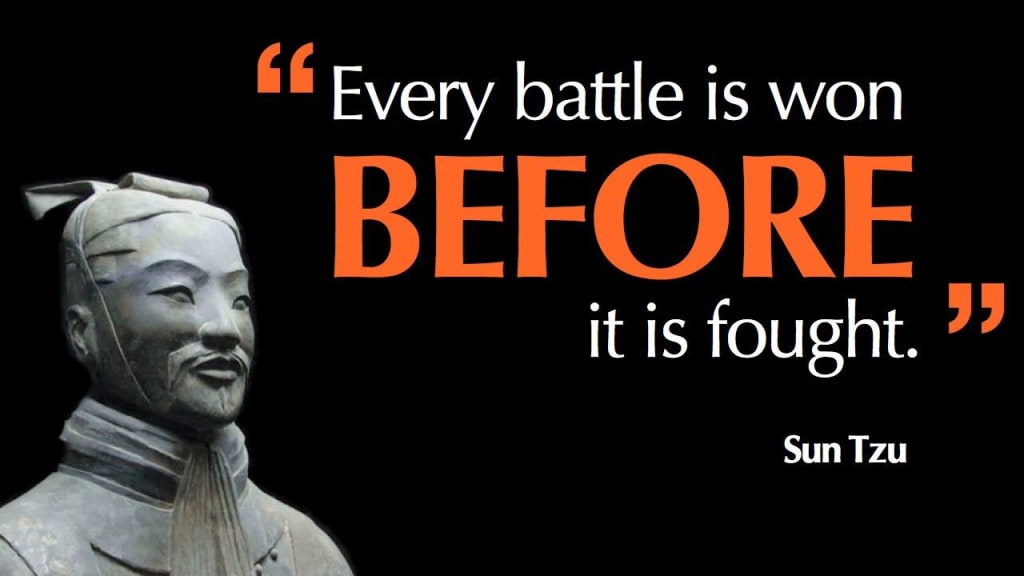Lessons From "The Art of War" ∙ Sun Tzu's Philosophy ∙ Mindset Hacks for Everyday Life
Live out your potential by adopting Sun Tzu's philosophy in his book "The Art of War" with our mindset hacks and lessons from the book "The Art of War" ∙ Chapter Summary

Original Article: https://www.hacksvitae.com/life-hack/lessons-from-the-art-of-war-sun-tzu-philosophy-mindset-hacks-for-everyday-life
Website: https://www.hacksvitae.com/
—
SUN TZU'S PHILOSOPHY
Sun Tzu was a Chinese military general, strategist, and philosopher who lived in the Eastern Zhou period, around 500 BC. He is best known for his book "The Art of War," which is considered one of the most influential works on military strategy and tactics.
Sun Tzu's philosophy is based on the idea of "winning without fighting." He believed that the ultimate goal of any conflict was to achieve victory with minimal losses, and that the best way to do this was to outmaneuver your opponent rather than engaging in direct confrontation.
One of Sun Tzu's most famous quotes is "All warfare is based on deception." He believed that successful military leaders should be skilled in the art of deception, using tactics such as feints, distractions, and misdirection to confuse and weaken their opponents.
Sun Tzu also stressed the importance of preparation and planning, stating that "victorious warriors win first and then go to war, while defeated warriors go to war first and then seek to win." He believed that careful planning, intelligence gathering, and strategic thinking were essential to achieving victory.
In addition to his military philosophy, Sun Tzu also had a broader philosophy of life. He believed in the importance of self-discipline, humility, and wisdom, and he emphasized the need to adapt to changing circumstances and learn from one's mistakes.
Overall, Sun Tzu's philosophy emphasizes the importance of careful planning, strategic thinking, and the use of deception to achieve victory in conflict, while also stressing the importance of self-discipline and adaptability in all areas of life.
CHAPTER SUMMARY
"The Art of War" is a Chinese military treatise written by Sun Tzu, a Chinese general, military strategist, writer and philosopher. It is considered one of the most influential works on military strategy and tactics in the world. The book is composed of 13 chapters, each of which covers a different aspect of warfare, including planning, strategy, and tactics. The principles outlined in the book are not limited to military conflicts but can be applied to a wide range of situations, from business and politics to sports and everyday life. The book's main goal is to provide a guide for understanding the dynamics of power, and how to use it effectively.
Chapter 1: "Laying Plans"
Chapter 1 covers the importance of having a clear and well-thought-out plan before going to war. Sun Tzu emphasizes that a leader must have a clear understanding of the objective of the war and the resources available to achieve it. He also stresses the importance of understanding the enemy and the terrain on which the battle will take place. He advises that a leader should carefully consider all possible options before making a decision and should be able to adapt to changing circumstances. He also notes that a leader should be aware of the moral and political aspects of warfare and be able to use them to gain an advantage over the enemy.
Chapter 2: "Waging War"
Chapter 2 covers the importance of understanding the nature of war and the factors that determine its outcome. Sun Tzu states that a leader should have a clear understanding of the objective of the war, the resources available, and the enemy's strengths and weaknesses. He also stresses the importance of understanding the moral and political aspects of warfare and of being able to use them to gain an advantage over the enemy. He advises that a leader should be able to adapt to changing circumstances, and that they should be able to use all available resources, including diplomacy and deception, to achieve their objectives.
Chapter 3: "Strategic Attack"
Chapter 3 covers the importance of having a clear strategy and knowing when to attack. Sun Tzu states that a leader should be able to identify the enemy's weaknesses and exploit them, and that they should be able to use all available resources, including diplomacy and deception, to achieve their objectives. He also stresses the importance of being able to adapt to changing circumstances, and of knowing when to attack and when to retreat. He advises that a leader should be aware of the moral and political aspects of warfare and be able to use them to gain an advantage over the enemy.
Chapter 4: "Disposition of the Army"
Chapter 4 covers the importance of organizing and positioning the army for battle. Sun Tzu emphasizes the importance of knowing the terrain, the enemy, and the objective of the war in order to position the army effectively. He advises that a leader should be able to adapt to changing circumstances and to use the terrain to their advantage. He also stresses the importance of using spies to gather intelligence about the enemy and to use that information to position the army in a way that will give them an advantage in battle.
Chapter 5: "Energy"
Chapter 5 covers the importance of having a strong and motivated army. Sun Tzu states that a leader should be able to inspire and motivate their soldiers to fight with energy and determination. He emphasizes the importance of providing the soldiers with the resources they need, including food and equipment, and of making sure that they are well-rested and well-fed. He also stresses the importance of maintaining good discipline and keeping the soldiers informed about the objectives of the war.
Chapter 6: "Weak Points and Strong"
Chapter 6 covers the importance of identifying and exploiting the enemy's weaknesses while protecting one's own strengths. Sun Tzu advises that a leader should be able to identify the enemy's weaknesses and exploit them while protecting their own strengths. He emphasizes the importance of using spies to gather intelligence about the enemy and of using that information to plan the attack. He also stresses the importance of keeping the soldiers informed about the objectives of the war and of maintaining good discipline.
Chapter 7: "Maneuvering an Army"
Chapter 7 covers the importance of being able to move and position the army effectively. Sun Tzu emphasizes the importance of being able to move the army quickly and efficiently, and of being able to adapt to changing circumstances. He advises that a leader should be able to use the terrain to their advantage and to use spies to gather intelligence about the enemy's movements. He also stresses the importance of being able to move the army in a way that will give them an advantage in battle.
Chapter 8: "Variation in Tactics"
Chapter 8 covers the importance of being able to adapt to different situations and to use different tactics. Sun Tzu advises that a leader should be able to use different tactics depending on the situation. He emphasizes the importance of being able to use different tactics to exploit the enemy's weaknesses and to protect one's own strengths. He also stresses the importance of being able to adapt to changing circumstances and of being able to use spies to gather intelligence about the enemy.
Chapter 9: "The Army on the March"
Chapter 9 covers the importance of being able to move and supply an army effectively. Sun Tzu advises that a leader should be able to move the army quickly and efficiently and of being able to supply them with the resources they need, including food and equipment. He emphasizes the importance of being able to move the army in a way that will give them an advantage in battle and of being able to adapt to changing circumstances. He also stresses the importance of being able to use spies to gather intelligence about the enemy's movements and of being able to protect the army's own supplies and lines of communication.
Chapter 10: "Terrain"
Chapter 10 covers the importance of understanding the terrain on which a battle will take place. Sun Tzu states that a leader must know the lay of the land, including the roads, rivers, mountains, and other natural features, in order to plan their strategy effectively. He also states that a leader should seek to occupy high ground, control key points, and prevent the enemy from using natural features to their advantage. Sun Tzu emphasizes that terrain is a crucial factor to be considered and that it can greatly impact the outcome of the battle. He advises to choose the terrain that favors your army and to avoid terrain that can give advantages to the enemy. For example, he advises to choose a battlefield with a narrow pass for a small army and a wide-open plain for a large army. Sun Tzu also stresses the importance of defending the strategic points such as mountain passes and river crossings. He notes that the possession of these points can make it difficult for the enemy to move and can give you an advantage in the battle.
Chapter 11: "Nine Variations"
Chapter 11 covers the different types of terrain that a leader may encounter, including open ground, entangling terrain, serious terrain, and death ground. Sun Tzu states that a leader should be familiar with all nine variations of terrain and be able to adapt their strategy accordingly. He explains that different types of terrain require different strategies, and that understanding the terrain is essential to making the right decisions. He also stresses that the ability to adapt to different types of terrain is a sign of a skilled leader. For example, he advises a leader to avoid entangling terrain, which is difficult to move through, and to take advantage of serious terrain, which can be used to defend against the enemy.
Chapter 12: "The Attack by Fire"
Chapter 12 covers the use of fire as a weapon in warfare. Sun Tzu states that fire can be used to destroy the enemy's supplies and morale, and that a leader should be familiar with different methods of starting and controlling fires. He explains how to use fire to attack the enemy's camp, fortifications, and supplies, and how to use it to deceive and confuse the enemy. He also notes that using fire as a weapon can be risky and that it must be used strategically and with caution. He advises to use fire as a last resort and to use it in a way that will not compromise your own position. For example, he advises to set fire to the enemy's supplies and camp at night, when visibility is poor, and to use fire to create confusion during the battle.
Chapter 13: "The Use of Spies"
Chapter 13 covers the importance of gathering intelligence in warfare. Sun Tzu states that a leader should use spies to gather information about the enemy's plans, strengths, and weaknesses. He also states that a leader should be careful to protect their own secrets, and to use spies in a way that does not compromise their own position. He emphasizes that intelligence gathering is essential to making informed decisions and that it is a powerful tool for gaining an advantage over the enemy. He stresses that having a good spy network is vital for the success of a campaign, and that it should be used to gain information about the enemy's plans, strengths, and weaknesses. He also advises to use spies to gather information about the enemy's morale, and to use them to spread rumors and misinformation.
MINDSET HACKS AND LESSONS FROM "THE ART OF WAR"
Know yourself and your enemy
Sun Tzu emphasized the importance of understanding yourself and your enemy. In everyday life, this means knowing your strengths and weaknesses, as well as those of the people around you. By understanding what you're good at and what you struggle with, you can make better decisions about what tasks to take on and how to approach them. And by understanding the motivations and goals of others, you can better anticipate their actions and reactions.
Understand your environment and your enemy
Sun Tzu's "Art of War" emphasizes the importance of understanding the environment in which you operate, as well as the strengths and weaknesses of your opponents. In real life, this means conducting research and analysis to gain a deep understanding of the industry, market, and competition.
Develop a strategy and plan of action
Once you have a deep understanding of your environment and your opponents, develop a strategy and plan of action to achieve your goals. This means identifying your objectives, strengths, and weaknesses, and creating a plan that leverages your strengths and addresses your weaknesses.
Be flexible and adaptable
Sun Tzu stresses the importance of being flexible and adaptable in the face of changing circumstances. In real life, this means being willing to adjust your strategy and tactics as needed based on new information and developments.
Make use of deception and surprise
Sun Tzu advises making use of deception and surprise to gain an advantage over your opponents. In real life, this can mean using unconventional methods or unexpected tactics to catch your opponents off guard and gain a competitive edge.
Focus on the objective, not the opponent
Sun Tzu advises to focus on the objective, not the opponent. In real life, this means focusing on achieving your goals, rather than getting caught up in personal battles or conflicts.
Build and maintain alliances
Sun Tzu advises building and maintaining alliances with other individuals, organizations, or nations. In real life, this means building relationships and partnerships that can provide mutual benefits and support.
Maintain the initiative
Sun Tzu advises to maintain the initiative and keep the enemy off balance. In real life, this means taking action and making decisions that put you in control of the situation and put your opponents on the defensive.
Avoid a direct confrontation if possible
Sun Tzu advises to avoid direct confrontation if possible, and instead use indirect methods to achieve your objectives. In real life, this means looking for creative and unconventional solutions that allow you to achieve your goals without engaging in direct conflict.
Know when to fight and when to retreat
Sun Tzu advises knowing when to fight and when to retreat. In real life, this means knowing when to stand your ground and when to pull back and regroup.
Always be aware of the setting
Finally, to apply Sun Tzu's principles in real life, one must be aware of the environment and the people around them and have a clear understanding of their goals and objectives. Also, one should be able to adapt to changing circumstances and have a strategic mindset.
Focus on the big picture
Sun Tzu emphasized the importance of seeing the whole battlefield, not just individual skirmishes. In everyday life, this means keeping your long-term goals in mind, even as you deal with day-to-day challenges. By focusing on the big picture, you can make sure that your actions are moving you in the direction you want to go.
Take calculated risks
Sun Tzu believed that sometimes it's necessary to take risks to achieve success. But he also emphasized the importance of calculating the risks and being prepared for the consequences. In everyday life, this means weighing the pros and cons of different options and making informed decisions based on that analysis.
Use your resources wisely
Sun Tzu emphasized the importance of using your resources efficiently and effectively. In everyday life, this means making the most of your time, money, and energy. By prioritizing your tasks and focusing on what's most important, you can make sure that you're using your resources in the most effective way possible.
—
In conclusion, "The Art of War" emphasizes the importance of proper planning, strategy, and tactics in warfare, as well as the psychological and political dimensions of conflict. The book stresses the importance of understanding the dynamics of power and using it effectively, as well as knowledge, wisdom, and flexibility in achieving victory in any conflict. The author, Sun Tzu, also highlights the importance of understanding the enemy and oneself, and the importance of timing, objective and a well-defined plan. The principles outlined in the book are timeless and can be applied to a wide range of situations, from military conflicts to business and everyday life.
—
Sources:
The Art of War by Sun Tzu | Art of War Quotes & Summary - Video & Lesson Transcript | Study.com
The Art of War (nationalgeographic.org)
The Art of War by Sun Tzu | Goodreads
Sun Tzu's Philosophy: The Goals and Art of War | Shortform Books
What Is Sun Tzu Philosophy? -Famous Chinese Military Strategist | Son Of China
Sun-Tzu - World History Encyclopedia
15 Lessons "The Art of War" Teaches You About Winning Life Battles - Hongkiat
5 Art of War Lessons for Real Life (Sun Tzu) | Shortform Books
—
Keywords: Sun Tzu's Philosophy, The Art of War, military strategy, deception, preparation, planning, adaptation, self-discipline, Lessons from The Art of War, Laying Plans, Waging War, Strategic Attack, Disposition of the Army, Energy, Weak Points and Strong.
Sun Tzu's Philosophy: The philosophy of Sun Tzu is based on the idea of winning without fighting. He believed that preparation, planning, and strategic thinking were essential to achieving victory, along with the use of deception and the ability to adapt to changing circumstances.
The Art of War: A Chinese military treatise written by Sun Tzu, composed of 13 chapters, which outlines principles that can be applied to a wide range of situations, from business and politics to sports and everyday life, not limited to military conflicts.
Military Strategy: The art of planning and directing military operations, including the coordination of units, the establishment of objectives, and the selection of tactics and resources to achieve them.
Deception: The act of intentionally misleading someone or causing them to believe something that is not true. Sun Tzu believed that successful military leaders should be skilled in the art of deception, using tactics such as feints, distractions, and misdirection to confuse and weaken their opponents.
Preparation and Planning: The process of getting ready or making arrangements in advance of a particular event or task. Sun Tzu stressed the importance of careful planning, intelligence gathering, and strategic thinking as essential to achieving victory.
Adaptation: The ability to adjust to new conditions or changes in one's environment. Sun Tzu emphasized the need to adapt to changing circumstances and learn from one's mistakes.
Self-Discipline: The ability to control one's behavior, emotions, and impulses to achieve goals and objectives. Sun Tzu believed in the importance of self-discipline, humility, and wisdom.
Laying Plans: Chapter 1 of The Art of War that emphasizes the importance of having a clear and well-thought-out plan before going to war.
Waging War: Chapter 2 of The Art of War that covers the importance of understanding the nature of war and the factors that determine its outcome.
Strategic Attack: Chapter 3 of The Art of War that covers the importance of having a clear strategy and knowing when to attack.
Disposition of the Army: Chapter 4 of The Art of War that covers the importance of organizing and positioning the army for battle.
Energy: Chapter 5 of The Art of War that covers the importance of having a strong and motivated army.
Weak Points and Strong: Chapter 6 of The Art of War that covers the importance of identifying and exploiting the enemy's weaknesses while protecting one's own strengths.
Maneuvering an army: The ability to move and position the army effectively, using terrain and spies to gather intelligence, and adapting to changing circumstances.
Variation in tactics: The importance of adapting tactics to different situations, exploiting the enemy's weaknesses, protecting one's strengths, and gathering intelligence.
Army on the march: The importance of moving and supplying the army effectively, including providing food and equipment, using spies to gather intelligence, and protecting supply lines.
Terrain: Understanding the lay of the land, including natural features such as mountains and rivers, and using it to plan strategy, occupy high ground, and prevent the enemy from using natural features to their advantage.
Nine variations: Understanding the different types of terrain, such as open ground, entangling terrain, serious terrain, and death ground, and adapting strategy accordingly.
The attack by fire: The use of fire as a weapon to destroy the enemy's supplies and morale, and the importance of using it strategically and with caution.
The use of spies: The importance of gathering intelligence about the enemy's plans, strengths, and weaknesses, protecting one's own secrets, and using spies to gain an advantage over the enemy.
—
Original Article: https://www.hacksvitae.com/life-hack/lessons-from-the-art-of-war-sun-tzu-philosophy-mindset-hacks-for-everyday-life
Website: https://www.hacksvitae.com/
About the Creator
Hacks Vitae
“Vitae” • Latin for “course of life” - Hacks Vitae is an online library of LIFE HACKS to help hack and unlock your true potential.
Life Hacks ∙ Business • Finance • Fitness • Nutrition • Neuro • Mindset • Motivation • Self-Help ∙ Philosophy






Comments
There are no comments for this story
Be the first to respond and start the conversation.